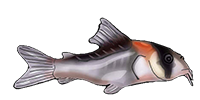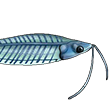There probably are some species where this would apply - but it probably isn't the general rule. I also can't think of any of these species which actually have albino morphs in the trade.
So let's talk about suffering. Most of what we've been discussing hasn't actually been about suffering. Everyone seems to be against actual suffering - dyeing fish, keeping them in cramped quarters, etc. However, what we've been discussing is fish who are inconvenienced. Except they aren't, really, because we take care of getting them food, lowering their light level, etc. Is being blind (which is even more extreme than what we're discussing) suffering? My blind friends don't think it is. It's an inconvenience, and it's one they know about because they talk to other humans who have full sight.Bas Pels wrote: ↑09 Apr 2017, 09:09From the above, I think there is going to develop a consensus that while we may dislike albino´s (or not) the real point is the well-being of the fish. For many albinos we do not know the result of this albinism - and here comes the problem. If you are not certain the fishes´well being is in trouble, do you say `you can´t say the fish suffers, and it is breeding, so I will continue` or will you say `you can´t be certain the fish does not suffer, so I will not breed it`.
I think this difference in attitudes is seen more and more. Not only in ethics
If you want to talk about suffering we'd need to see evidence of disease or mortality. Now, albinism can result in skin lesions which are presumably painful, but that's in high-light conditions. There are many naturally albino cave catfish out there, which suggests that albinism is harmful only under a particular visual environment and actually carries benefits in other environments.
Also, I'll say it again, but albinism isn't one thing. There are many genetic ways to make an albino, and some come with other complications. (There's a type of albinism in horses that is lethal if both copies of the gene show that mutation.) If we were discussing a form of albinism that caused some other side effect, like tumors, that would be clear evidence of suffering. I'm not even talking about scientific paper grade evidence - if I started seeing a lot of people saying albino bristlenose had shorter lifespans than their colored conspecifics I'd say that was sufficient to avoid breeding them. (Although it is possible for a species to have a shorter lifespan without additional suffering. I don't assume that mice have lives of misery because they only live a few years at most.)





